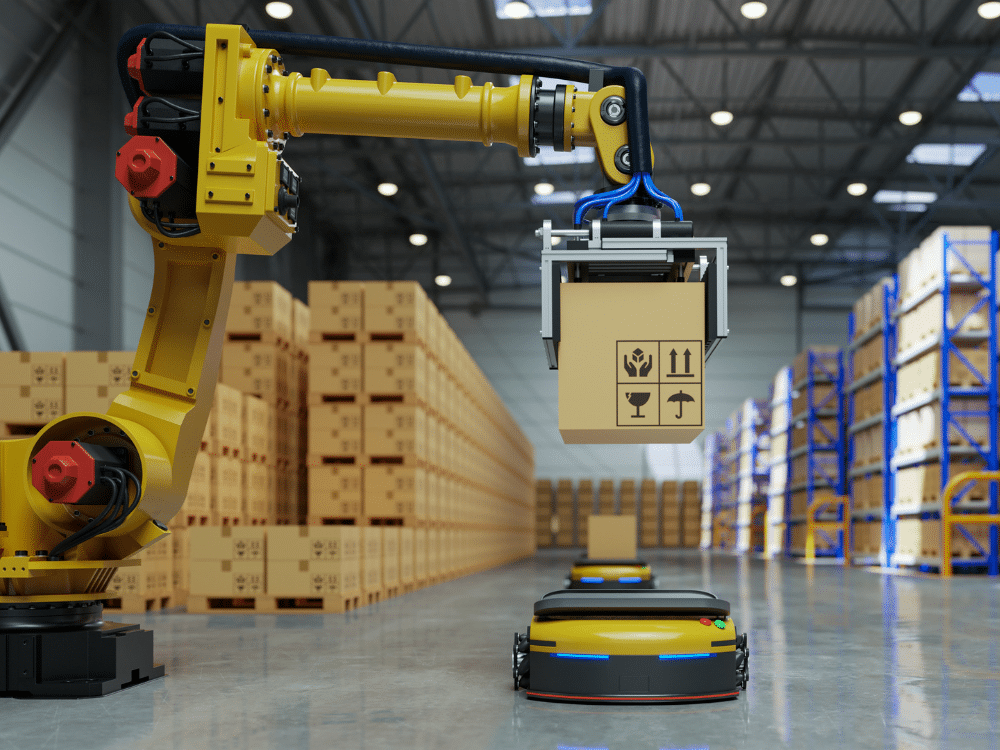Logistics Technology in 2025: AI, Automation, & Beyond
Melton Logistics – 06/25/2024
As logistics efficiency has progressed from basic handwritten notes and forms tacked to the sides of goods containers to multi-level warehouses organized by robotics, it would appear that we’ve hit the limit of just how far technology can improve our industry. However, AI has found ways to push the limits just a little further.
Only a few years ago, the idea of allowing AI, or artificial intelligence, to handle the constantly shifting needs that come with transportation and logistics would have seemed outrageous. As of 2025, though, AI has found a solid foothold in the logistics industry and is actively being used to revolutionize the way regular tasks are done.
How is AI Being Used in Logistics?
Predictive Analytics – Forecasting in any industry can be a tricky task. Previously, data analysts were usually required to spend hours reviewing historical data, conducting outside market studies, and compiling their findings into reports. As technology has advanced, developers have made specific software to cater to these needs specifically. Though these softwares still require hands at the wheel to provide some information and monitor performance, AI-powered tools have made accurately predicting market trends, creating dynamic models, and compiling huge lists of data much more efficient.
Route Optimization – Route optimization is critical for any logistics organization, as it determines the most efficient route to move goods to save money and time. AI-driven route optimization can be a game changer for many companies, as the system can be used to scan real-time traffic data, road closures, severe weather, and even find specific road regulations that can change from state to state. Providing this information quickly can reduce fuel costs, reduce disruptions, improve delivery times, and ensure that drivers and their cargo arrive safely.
Warehouse Automation and Robotics – A great case for the use of AI in logistics can be found in automated warehousing and robotics-powered solutions. Where previously thousands of man-hours were needed to stock, organize, and maintain large-scale storage spaces, companies that have started utilizing AI-powered robotics for tasks such as sorting or transporting goods across warehouses have significantly reduced errors, improved human safety, transforming traditional warehouse spaces into efficient distribution centers.

Resource Management – Developing plans for resource management is difficult to do manually, especially with the constantly changing needs of customers and market conditions. AI-powered tools can quickly provide resource usage data for all the branches of a business, making real-time demand forecasting much simpler. Some software can also analyze usage data and highlight any patterns of waste that can then be addressed by an employee, or resource distribution can be directed automatically.
What Are the Drawbacks of AI in Logistics?
Implementation Costs – As with many new technologies, it can be expensive to overhaul older systems and implement AI-powered tools as replacements. Not only does the program itself cost money, but the downtime and missed opportunities that occur as a result of long implementation and onboarding times can add up quickly. Ideally, the new system should help your business save money and time in the long run, as long as you’ve done the proper research and have identified a tool that works for your company.
Data Privacy Concerns – Compared to having sensitive information stored physically, online information can be easier for criminals to steal and exploit if the proper measures aren’t taken. Make sure all employees are properly trained in basic cybersecurity measures they can take, like identifying fraudulent emails and creating a secure password. Your IT team should also be staying on top of any new methods of cybercrime and should be alerted immediately in case of suspicious activity.
Will AI Replace Logistics Jobs?
A common fear with artificial intelligence is that it will replace many jobs and positions held by humans. Luckily, the truth is far less daunting. AI will indeed make a lot of tasks more efficient, but logistics companies should think of it as a tool to assist humans rather than a replacement. AI does not have the capacity to understand your individual business’ needs in the same way that a seasoned employee will, and many roles still require the element of human connection that artificial intelligence can’t replicate. So, while logistics positions might have different tasks assigned to them in the future, there will always be a need for human employees.
As new developments in AI continue to emerge, staying informed and adaptable is the key to maximizing the advantages AI can provide for your business. At Melon Logistics, we use modern technology to make our shipments as efficient and transparent as possible, while still providing the high-quality service our customers expect. Learn more about the services we offer here!
